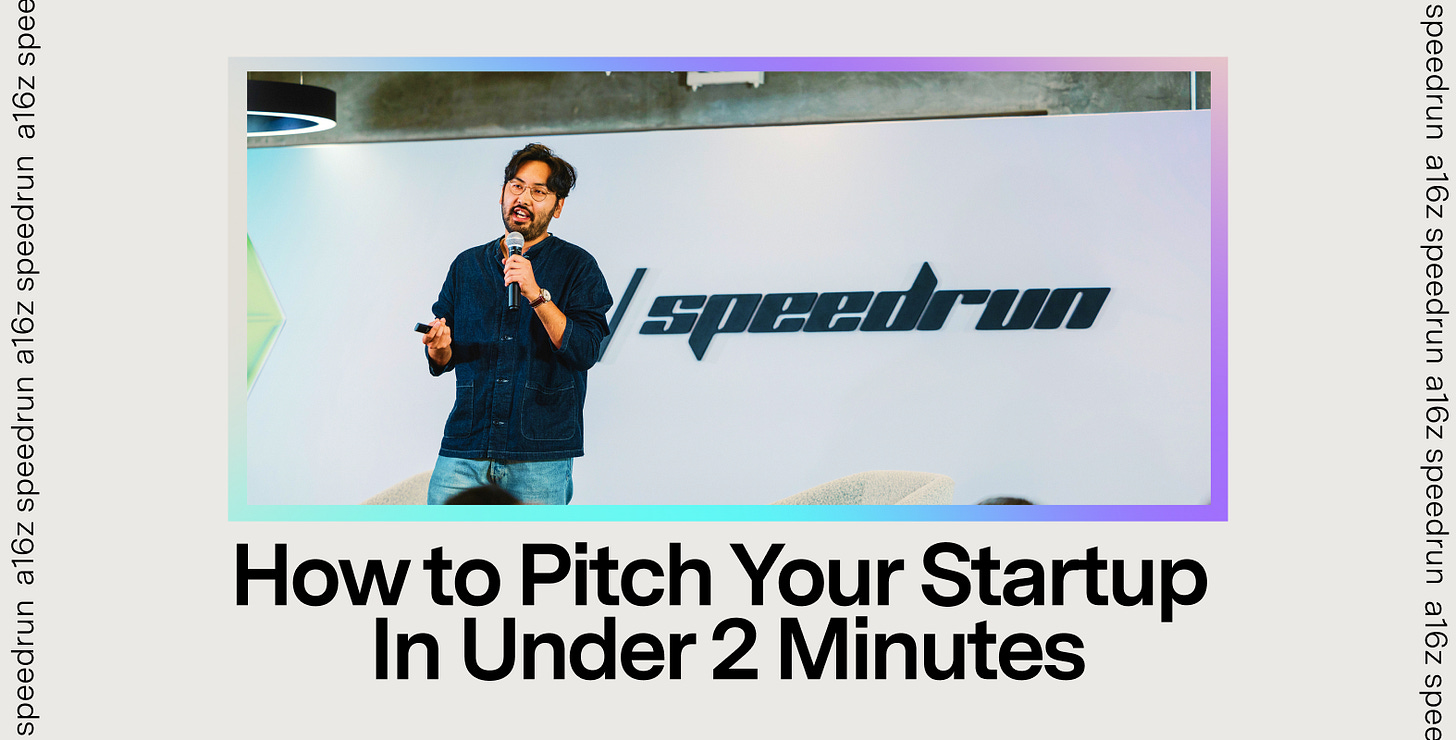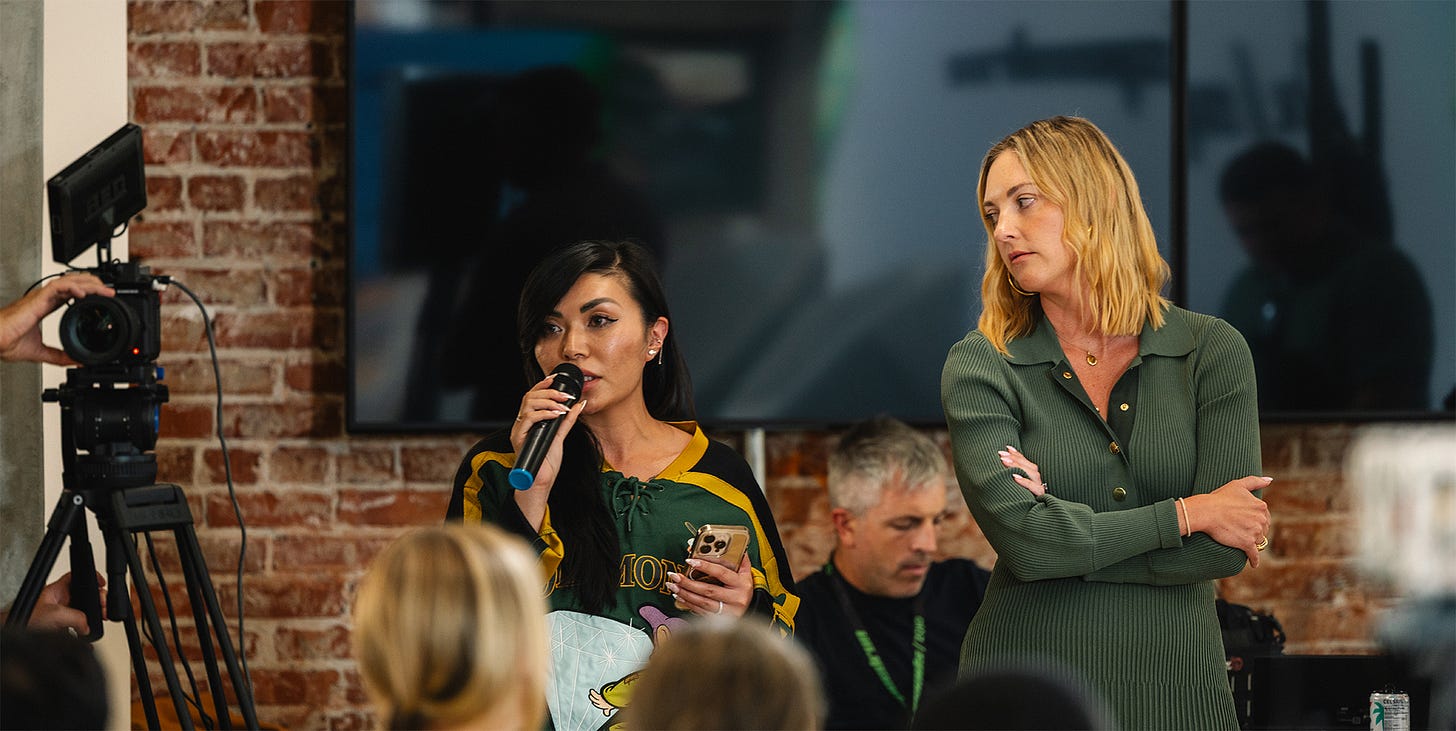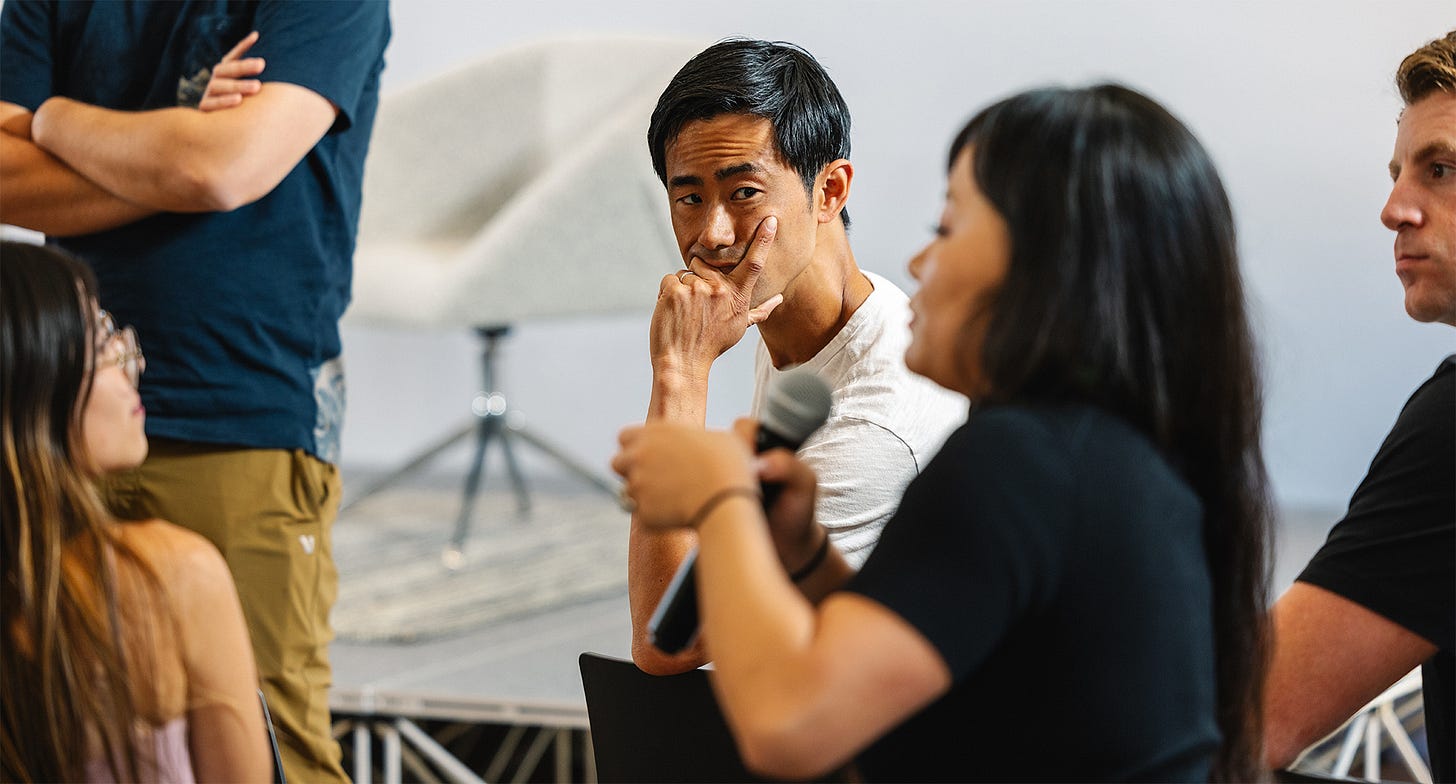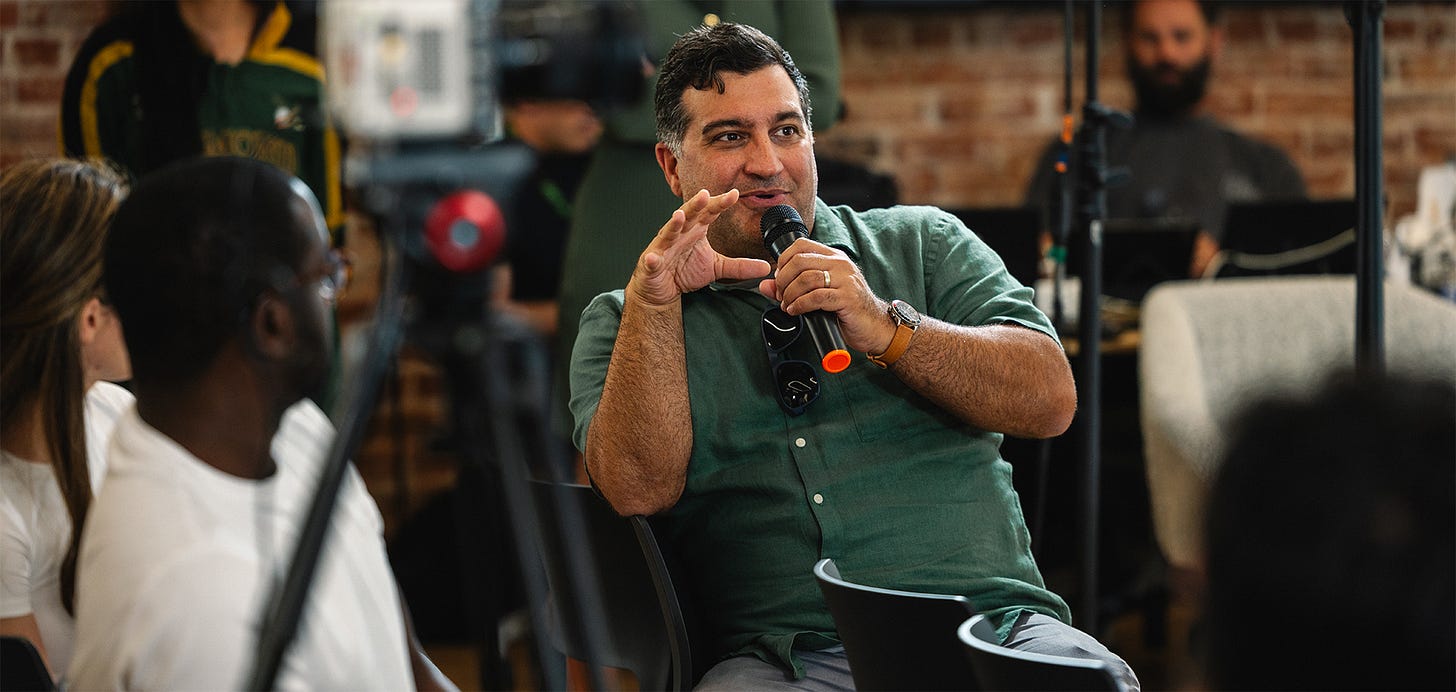How to Pitch Your Startup In Under 2 Minutes
An exclusive look behind the scenes at a16z speedrun SR005's Progress Day
The SF/LA Tech Week calendar just went live with 1,500+ events, more than double from last year! It’s a packed lineup built for founders with investor events, GTM deep dives, founder salons, and more. Explore it all here: tech-week.com/calendar
💡 This Week’s Big Ideas
🧊 Remember, applications for SR006 are open now through September 28th! Secure up to $1M for your startup by applying today.
🔨 For founders based outside of the US, getting here for speedrun can feel like such a daunting process. In this video, Tom Hammer explains the Global Founders Program, our solution for helping international founders make the move.
⚡ This Friday evening Robin Guo and Ryan Rigney are hosting a live Q&A Office Hours with Super.com’s Henry Shi. Sign up to join the call and ask Henry your questions about the lessons he learned building a $200M/year business.
💼 Join our talent network for more opportunities. If we see a fit for you, we'll intro you to relevant founders in the portfolio.
At its core, speedrun is a program designed to help early stage founders reach their next stage: nabbing that lighthouse customer, hiring the right team, raising the next round. And one of the big, milestone moments in the 12-week program comes at the halfway mark. We call it Progress Day.
On Progress Day, each founder gets just two minutes on stage to pitch their startup to a room full of their peers. After each pitch, our team of investors call out feedback from the front row—loudly enough for every other founder watching to take notes and apply lessons to their own slides.
To get a feel for what this is like, we’re sharing footage of the Progress Day pitch from Fearn AI co-founder and CEO Han Kim, who earned high marks from the investors with his pitch for an AI-powered assistant for drafting intellectual property. This is the kind of pitch that could easily bore an audience to tears, but Kim won over the crowd with his cogent breakdown of the problem space, a brisk summary of his team’s technical edge, and a touch of humor. Watch Kim’s pitch in full below:
Progress Day Pitch - Han Kim (Fearn AI)
Kim says that he and his co-founder, Angela Gao, first watched Demo Day pitches from previous speedrun cohorts, then consulted advice from the investing team. Then they began to piece together a narrative.
“For us, it felt straightforward,” Kim says. “We started Fearn because of the problems I experienced in my past job, and we built our team and our tech to address that problem. In terms of practice: It’s a short pitch, so we figured we couldn’t freeform it. We wrote out a script. We then practiced it several times the day before, until it felt approximately memorized.”
The night before Progress Day, Kim says, he and Gao got together with a group of other speedrun founders to practice and give each other feedback as well. “One of the best parts of the speedrun community is being surrounded by other founders you trust and admire,” he says. “We felt that made the biggest impact.”
We asked Kim: Why do you think your pitch was so well-received?
His response:
In general, we did our best to convey a personalized story. So a heuristic might be: if someone else pitched our pitch, would it make any sense at all? Ideally, the answer should be no. So our thinking there was to try and emphasize things that were the natural results of our strong founder-market fit. For example, we talk about us building our own hyper-compact foundation models (something that only people like ourselves can do, from our time as Caltech PhD students), and we explain why we built our own foundation models for our industry (an insight that can be recognized only after working as a Big Law patent prosecutor with a strong technical background). We wanted every statement in our pitch to feel justified by our own talents and experiences.
—Han Kim, co-founder and CEO of Fearn AI
In all, over 60 startups in the class of SR005 presented on-stage at Progress Day. Each went through a grueling effort to prepare their own presentations. We wondered: what advice might they have for other early stage founders?
So we asked a handful of founders with particularly well-received pitches three questions: how they prepped for their presentation, what advice they’d give to other founders, and what their goals are as they enter the final weeks of the program and look toward Demo Day.
Question 1: How did you prep for your Progress Day pitch?
From Kevin Jiang, co-founder and CEO of Azimov:
I consumed all prior Demo Day pitches and marked down the ones that stood out to me. I broke down the structure of those pitches. Based on the learnings there, I wrote a script for my pitch. I sent the pitch to previous speedrunners and got feedback. I refined my script. Then I created a wireframe of the pitch and imagined myself speaking as I went through the wireframe. I imagined the slides that would capture people’s attention and left out the slides where I couldn’t imagine people being captivated. I then turned the wireframe into a proper deck.
I watched Ted talks or podcasts where someone was speaking in a way that captivated me. I broke down the way they speak, their facial and body gestures. I then imagined myself almost embodying the way they speak and move.
I filmed myself doing the pitch (this is something I do for all pitches) until I nailed the tempo, content, pronunciations, and my body gestures.
From Alexis Sursock, co-founder and CEO of Luvu:
Fake-presenting in front of our bathroom mirror 50 times.
From Philipp Wehn, co-founder and CEO of Nexxa.ai:
We really wanted to share why this matters front and center. Second, we focused on showing why we are winning and will dominate this market. It all started old school with pen and paper—yep, real paper! After the story was done we designed the deck and started pitch practice
Progress Day Pitch - Taylor Offer (Atrios)
From Taylor Offer, founder and CEO of Atrios (see full pitch above):
Whenever I’m communicating to anyone, whether it’s chatting to a friend, writing a social media post or giving a pitch on stage, I tend to think in three parts.
1. Hook (You need someone to be interested enough to listen)
2. Meat (This is where you deliver the info, must match the hook)
3. Payoff (What can they walk away with).
From Maxwell Wang, co-founder of Dispatcher:
We ideated on the content for a long time but only put the deck together the week before. Nick Clouse helped me practice delivery and condense the first draft into something more succinct. Then just read the speech over and over again probably 100 times, while sending recorded attempts to Troy and Nick for review.
Question 2: What advice would you offer to other early-stage founders putting together their own 2-min pitch?
From the co-founders of Anchr (currently in stealth):
Boil it down to four one-sentence pillars: the problem, the solution, the founders, and the traction. String them together, check the timing, and recognize that everything else is just execution.
From Philipp Wehn, co-founder and CEO of Nexxa.ai:
Less is more. Instead of thinking how much can I share in two minutes, the approach for Demo Day will be: what is the absolute best thing about us that has to be shared within one minute. That approach will 10x the quality of the pitch. Ask yourself: what are the 1-3 things that spike interest in this company?
From the co-founders of Dispatcher (currently in stealth):
The best advice that people gave during Progress Day, and that I agree with, is that people will only take away one or two things from your presentation. So focus your presentation on those ideas.
From Lior Strugach, co-founder and CTO of Argu:
Emphasizing our traction metrics was crucial. This is one of the most important aspects that helped us nail the pitch and can help others as well.
Progress Day Pitch - Alexis Sursock (Luvu)
From Alexis Sursock, co-founder and CEO of Luvu (see full pitch above):
Pick the one or two sentences you want investors to write down about your pitch. Everything you say should support that. If you’re early, that’s usually about what makes your product and/or team experience stand out.
If you’re later, it’s traction (users, retention, revenue). Investors hear endless pitches for similar products from similar teams.
Your pitch needs to be succinctly memorable (In our case, we're going for: "Unhinged marshmallow cursed at lazy people. Retentive Accountability Partner by Duolingo + AI experts")
From Fearn’s Han Kim:
Get iterative feedback from other founders. We’re surrounded by a bunch of brilliant and decent folks at a16z speedrun. Find those people, get their opinions, and rinse and repeat. When you’ve thought about something too hard and long (so every founder and their company), it’s easy to miss the forest for the trees. A two minute pitch is a “find the forest” exercise. A separate pair of eyes is very useful for finding the forest.
From Kevin Jiang, co-founder and CEO of Azimov:
The thing I think most people don’t realize—or that they do realize but don’t truly internalize—is that at the end of the day your entire startup gets distilled down into a one-liner in someone else’s brain. Usually it’s something like “oh the AI recruiter app with decent traction” or “the guys making the drones, I think they're pre traction but have a good team.” For us, I tried to imagine what would be the ideal distilled one-liner people extract from us. I wanted ours to be “the guys with insane traction making AI companions.” If the day ends and every single person can walk away with this one-liner about us in their minds, then we did our job. If any slides helped craft that impression, they stayed. If not, that slide got cut.
From Leo Korsunsky, co-founder of Oleum:
Just practicing the pitch while timing yourself. Our pitch ran slightly over so this is still something we have to work on.
Question 3: What are your plans between now and Demo Day?
From Fearn’s Han Kim:
There’s not much time between now and Demo Day. We’re doing what we’ve always done: improving our models, building our software, and selling our product. But we’re also starting to think about fundraising, in earnest: who out there understands our vision, and understands why we’re taking the approach we’re taking? Fortunately, we trust the a16z speedrun community to help us navigate that world.
From Lior Strugach, co-founder of Argu:
We’re refactoring our entire deck! Planning to hire a professional designer to align everything with our new branding.
From Alexis Sursock, co-founder and CEO of Luvu:
Make a splash: Go all in on getting users (and making them sweat).
From Taylor Offer, founder and CEO of Atrios:
Double our revenue, tighten the pitch, take over the world.
From the co-founders of Anchr (currently in stealth):
Close deals — and rock and roll.
That’s it for this week! Thanks to all the founders who shared their experience and thoughts with us.
For more weekly dives into the world of early stage startups, subscribe to our newsletter below.











Didn't know A16Z was on Substack! This is such incredibly valuable context. Thanks for sharing
You had me at hello